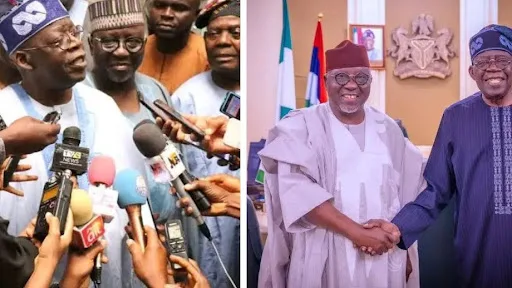There is a silent storm brewing within the ruling All Progressives Congress (APC), and it is gaining momentum beneath the calm exterior of political decorum. At the center of this storm is President Bola Ahmed Tinubu’s calculated move to appoint key members of the defunct Congress for Progressive Change (CPC) bloc as ambassadors—a gesture that on the surface looks like a reward but may very well be a well-wrapped political exile.
According to insider sources, a good number of prominent CPC figures have been shortlisted, not for strategic domestic appointments, but for ambassadorial postings. While this may look like an honourable gesture to outsiders, the inner logic is far more sinister: by sending these politicians out of the country, Tinubu not only neutralizes their influence but effectively sidelines them from Nigeria’s political theatre. In simpler terms, this is not an olive branch—it’s a gilded trap.
This wouldn’t be the first time President Tinubu has used such political sleight of hand. Observers recall how he fractured the People’s Democratic Party (PDP) by leveraging the ambitions and grievances of Nyesom Wike, splitting the party from the inside. Wike’s involvement in the infamous G5 movement laid the groundwork for PDP’s internal collapse. The Labour Party also wasn’t spared. With carefully stoked divisions and the promotion of factional leaders, Tinubu’s political network managed to reduce its effectiveness as a unified opposition force.
Now, with the CPC bloc being surgically carved from within, the parallels are striking. The Jagaban Borgu has long made it clear—either one aligns absolutely with his authority or risks political extinction. He has no tolerance for strongmen within his circle; his preference is for loyalists who owe everything to him and cannot dare challenge his grip on power. A glance at Tinubu's current circle is revealing: none of his top aides, appointees or ministers can win a local election without riding on his coattails. They are men and women who chant “Yes, Sir” with robotic precision and live politically at his mercy.
Even more alarming is the growing suspicion that some CPC members may not even get appointed at all. History tells us that Tinubu is known to "use and dump" individuals once they serve their purpose. Just ask former Lagos State governor Akinwunmi Ambode who was politically strangled out of office despite his loyalty. Or former allies like Rauf Aregbesola, who served Tinubu with unwavering devotion but later found himself excommunicated when he grew too independent. The list is long and telling.
If this Trojan horse tactic succeeds, it could split the CPC faction further, creating bitterness, distrust, and a renewed cycle of internal crisis. While some members may embrace the postings in hopes of diplomatic prestige, others are beginning to see the appointments for what they truly are: a trap designed to shrink their influence and send them far away from the battleground of 2027.
Tinubu's message seems clear—there can be no two captains in his ship. Only those willing to be passengers on his political cruise are welcome. But history has shown that even the most masterful chess players sometimes sacrifice a pawn too many—and end up exposed when their opponents learn the pattern.
For the CPC bloc, the coming days may define whether they remain part of the ruling machinery—or become another cautionary tale in the expanding list of Tinubu’s discarded alliances.
Tags
Corridors of Power

